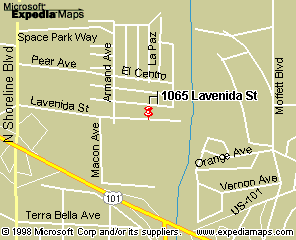Mountain View, Calif., August 6, 1998 — Microsoft Corp.’s decision to open a 32-acre campus in Silicon Valley is aimed at forging closer ties with the company’s partners and customers, and ensuring greater coordination and integration among Microsoft’s 800 employees located in Northern California.
The campus is scheduled to open in Mountain View in the summer of 1999 and will include more than 500,000 square feet of office space in five buildings for several Microsoft business groups currently dispersed among nine locations in Northern California. These groups include the Macintosh Internet Products Group, the Macintosh PowerPoint Product Unit, the Graphics Products Unit, Hotmail, Web Essentials Development, WebTV and the Cupertino Sales Office. The campus also will include a new Development Laboratory and Developer Community Center, designed to assist independent software developers in Silicon Valley.
“Microsoft has had a long history of partnering with Valley companies who share the vision of high-performance, low-cost computing,” said Microsoft President Steve Ballmer, who announced the new campus Thursday afternoon at a press conference held on the future campus site. “We think the new Development Lab and Developer Community Center that will be housed on this campus will provide valuable benefits to the more than 1,200 independent Windows developers in the Valley.”
Considered the heartland of the information revolution, Silicon Valley is home to 20 percent of the world’s 100 largest high-tech companies. The 50-mile corridor stretching from San Jose to San Francisco is home to one out of nine high-tech jobs in the U.S. Microsoft has had a presence in Silicon Valley since 1981, when it opened its first office with five employees in Mountain View. It has gradually expanded its staff to 800 employees, making it one of the larger technology employers in the region.

A Silicon Valley campus will reduce travel costs and increase productivity for Microsoft’s partners by providing them with the services they need right in their backyard. For example, the Microsoft Development Lab and Development Community Center are designed to provide the latest resources and technology to support the work of Silicon Valley software developers who build applications for the Windows platform. The lab will offer local third-party developers personalized, hands-on assistance from Microsoft technical personnel. The community center will host a wide range of educational events and business opportunities for developers, including user group meetings, training sessions and informal networking events. Both the lab and community center will open later this year in a temporary location in Palo Alto and will later be moved to Mountain View when the campus opens in 1999.
A central campus also will help Microsoft build closer relationships with other types of partners, such as system builders that manufacture PCs and sell software, and distribution partners that sell Microsoft software to retail outlets.
“Microsoft has been a good technology partner in the Valley,” said Becky Morgan, President and CEO of Joint Venture Silicon Valley. “This new campus is the latest indication that Microsoft is committed to the long-term future of the region and to the hundreds of other technology companies who call the Valley home.”
Along with providing better service to Microsoft partners, consolidation of Microsoft’s Northern California business groups into one location will benefit Microsoft employees by enabling them to better coordinate their work and provide more efficient customer services. It will also generate new opportunities for businesses in Mountain View and the surrounding area.
“Microsoft has 800 employees in the Valley, and it became clear we needed to find a single place where they all could come together to better serve customers and partners, and to create better coordination and integration,” Ballmer said. “We are delighted that Mountain View is our new home, and are excited about deepening our commitment to the Valley.”
In addition to launching the new campus, Ballmer met Thursday with representatives of several Valley technology start-ups to discuss present and future technologies. He also participated in a roundtable discussion with chief information officers (CIOs) from a number of Bay-area companies.
“One of my top priorities as president of Microsoft is spending more time talking with and listening to customers, partners and other technology companies,” Ballmer said. “The time I spent this morning with Valley start-ups and Bay-area CIOs was a great opportunity to exchange ideas and stay current on what everyone is doing. This kind of dialogue and cooperation really benefits everyone involved.”




